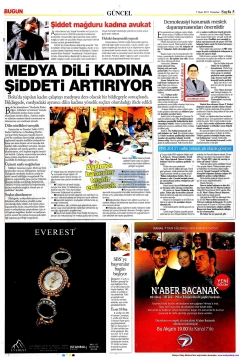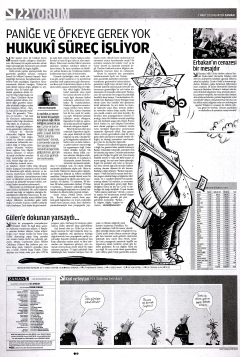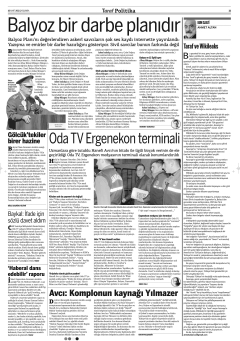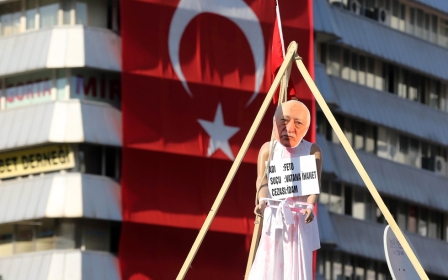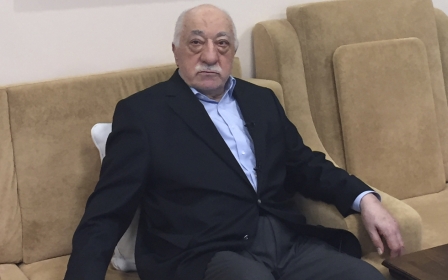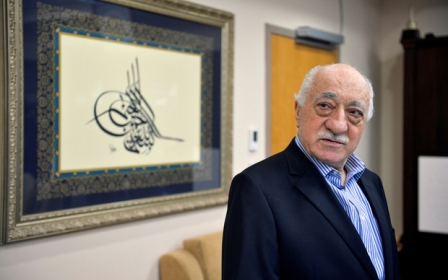ANALYSIS: Turkey's press freedom, and the hypocrisy of Gulen supporters
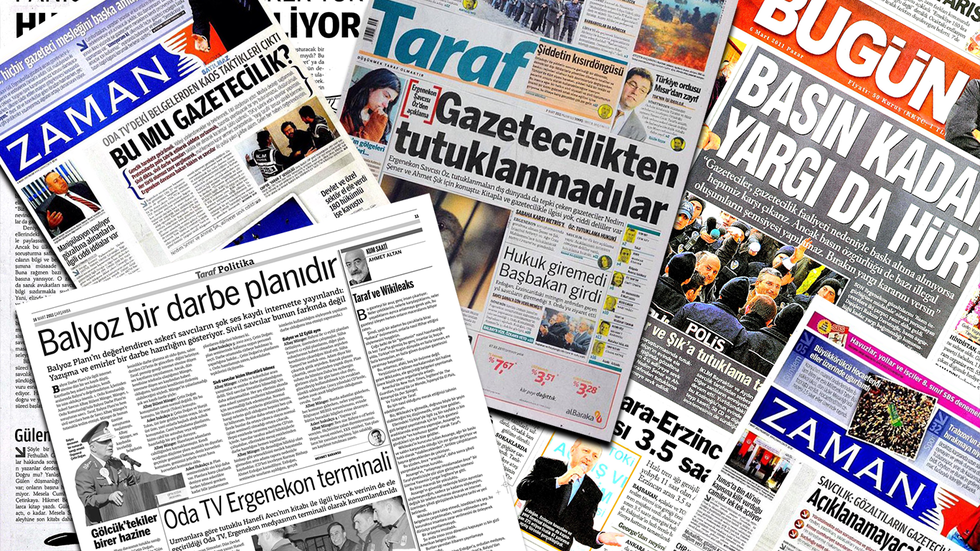
ISTANBUL, Turkey – At the age of 28, Baris Pehlivan was an idealist. He believed in the ideals upon which modern Turkey was founded, and chose to become an investigative journalist to help safeguard those same ideals.
He was made to pay dearly by a group that he says despised the values he stood for.
Nineteen long and lonely months of imprisonment meant his eyesight suffered badly, and his hair suddenly had more gray than black - and these were just the physically visible effects.
He was not surprised when they came for him. In fact, he was expecting it. When Pehlivan refers to "they," he is talking about Fethullah Gulen and his followers.
They have been accused of infiltrating various state mechanisms for the past four decades with the aim of delivering a fatal blow from the inside to the very foundations that the modern Turkish republic was built upon, and replace it with a theocracy under the reign of the Turkish cleric who has lived in self-imposed exile in the United States since 1999.
Turkish authorities accuse him and his followers of being behind a failed coup attempt on 15 July.
Gulen has denied the accusation, and his followers say they have become victims of a state-led purge ever since their cooperation with the ruling Justice and Development Party (AKP) government ended in late 2013.
According to Pehlivan and other political observers, the Gulenists organised under the guise of Hizmet ('service'). On the surface Hizmet ostensibly engaged in charity work, built schools worldwide offering quality education, by handing out scholarships to the poor, while simultaneously promoting Turkish culture and interfaith dialogue.
But, they say, it was all a front to allow them to gain enough strength – numerically, financially and diplomatically – to eliminate their enemies: the Kemalists, secularists and leftists.
Pehlivan was among a small group of journalists who dared to investigate Gulen’s movement and his followers in the previous decade when others were too scared to do so.
Gulen’s movement had its own media wing, which was completely dismantled by the government after it fell out with Gulen in late 2013.
Many of its journalists were jailed and hundreds of rank-and-file employees are now out of work.
Yet some of those in Gulen’s media empire managed to flee the country - and now use every platform to defend and promote press freedom.
What rankles with Pehlivan is that it is many of the same Gulen journalists who targeted him and his colleagues for their journalism who are now presenting themselves as staunch defenders of freedom of the press.
“Their hypocrisy, acting like nothing happened, and attempting to rewrite history makes one wonder how someone can be so evil,” said Pehlivan. “I don’t care about their lobbying. I only feel enraged because they made Turkey experience years of injustice. We are still suffering the pain and repercussions of those injustices.”
In those years Gulen media outlets raced to outdo each other in their attacks on journalists like Pehlivan. Headlines screamed: “They haven’t been arrested for their journalism,” “Is this journalism?” and “Defending democracy is more important than solidarity with colleagues.” And these were some of the lighter allegations levelled against those who dared to stand in their way.
Gulenist writers filled inch after inch of column space with material that was almost identical to the words of Zaman’s editor-in-chief Ekrem Dumanli: “It is not the job of us journalists to identify the guilty and innocent. But we have concrete knowledge of one thing: The junta and putschists have a media extension...”
They accused Pehlivan and his colleagues of being the media extension of a shadowy ultranationalist, secularist organisation called Ergenekon, which was determined to topple the ruling conservative government.
Many Turks, liberal and conservative, readily bought into this narrative that was being pedalled, given the country’s infamous record of carrying out military coups and actions more reminiscent of police states.
In 2014, a higher court threw out the entire Ergenekon case and issued the immediate release of all those incarcerated for supposedly being part of it.
A pact to get rid of common enemies
There is plenty of debate in Turkey at the moment over who had knowledge of the attempted coup, the role of the ruling AK Party in nurturing the Gulenists, and the continuing failure to capture major political figures involved in the coup.
But on one issue there is no debate: That the Gulen movement orchestrated the coup.
The lobbying efforts of Gulenist journalists are, however, proving effective internationally because AKP attempts to absolve itself of any role in abetting the rise of the Gulenists sound implausible.
When the AKP came to power in 2002 it felt threatened by the same groups that the Gulenists viewed as enemies. Turkey’s self-appointed guardians of its secular values in the military and judiciary had a record of intervening whenever they felt governments in power were becoming too Islamist or were straying from the path they protected.
The AKP and Gulen forged a pact.
Turkey has never enjoyed a good ranking in the Press Freedom Index run by Reporters Without Borders but its record has been particularly abysmal since 2009.
The year matters because the AKP and Gulen movement became arch foes only at the end of 2013 although rifts were beginning to appear earlier. It was on 17 and 25 December 2013 that Gulen’s followers in the police and judiciary brought major corruption charges against President Recep Tayyip Erdogan and his close circle.
Ragip Duran, a Turkish journalist who specialises in media ethics, told MEE that the concept of press freedom in Turkey has always been used as a political and ideological instrument by those engaged in power struggles.
“Look back at when they jailed the journalist Ahmet Sik for writing a book on Gulen called the Imam’s Army. He was jailed by Gulenists for a book that was banned even before it was published,” said Duran. “But the Gulenists also had Erdogan’s full backing who said ‘sometimes books can be more dangerous than bombs’.”
According to Duran, a large part of the problem is the media itself, which constantly publishes false stories to promote whoever is in power. He says that is why media has consistently ranked as the least reliable institution in Turkey for the last 25 to 30 years.
“Take the imprisonment of author Asli Erdogan now. There is not a shred of evidence to link her to terrorism but she is languishing in prison,” he said. “The problem is there are no standards and it is all arbitrary. This state of arbitrariness will have a boomerang effect and will come back to hurt the AKP too one day.”
Now 33, Pehlivan is editor-in-chief at the OdaTv news website. The same publication from where he was dragged off to prison on 18 February 2011.
“My imprisonment made the value of freedom even clearer to me,” he said. “It made me more determined to expose the organisation that jailed me.”
Pehlivan is no apologist for the AKP despite backing the crackdown against the Gulenists. He says that the persecution he and his colleagues faced would not have been possible without a political green light from the AKP.
He is also worried that on many occasions the AKP claims to be fighting the Gulenists but ends up emulating them, such as the government's treatment of the Zaman media group, the flagship of Gulen’s media empire.
He says the erasing of the Zaman media group’s digital archives and the closure of the paper’s website after government administrators took over was a mistake that played into Gulen’s hands.
“The digital archives should have been left accessible to everyone and should have served as a museum of shame for Turkish media. The Gulen movement probably loved seeing those websites get shut down. Clear evidence of how they used the media to support their unjust actions were lost,” Pehlivan said. “Such actions only end up making the Gulenists look good while preventing us from attaining justice,” he said.
Yusuf Kanli, a journalist and coordinator of the Press Freedoms Project, told MEE the problem lies in the targeting of journalists instead of media ownership structures, which are the real source of the problem.
“I was opposed to the Gulenist journalists when they persecuted the Kemalist journalists. Now I am opposed to whoever is persecuting the Gulenist journalists who are now victims,” said Kanli.
Kanli said this approach has only meant that many innocent journalists have been deprived of their work and livelihoods.
The real Gulenist journalists who made the editorial calls had planned their escape in advance and were prepared when the time came, fleeing the country.
It is these people that Pehlivan wants to see face justice.
“What saddens me is that some people in Turkey and abroad are still deceived by this mask they wear. They fail to see the crimes committed under those masks,” he said. “My only wish is that they face a fair trial for the crimes they committed in the guise of journalism.”
This article is available in French on Middle East Eye French edition.
Middle East Eye propose une couverture et une analyse indépendantes et incomparables du Moyen-Orient, de l’Afrique du Nord et d’autres régions du monde. Pour en savoir plus sur la reprise de ce contenu et les frais qui s’appliquent, veuillez remplir ce formulaire [en anglais]. Pour en savoir plus sur MEE, cliquez ici [en anglais].


